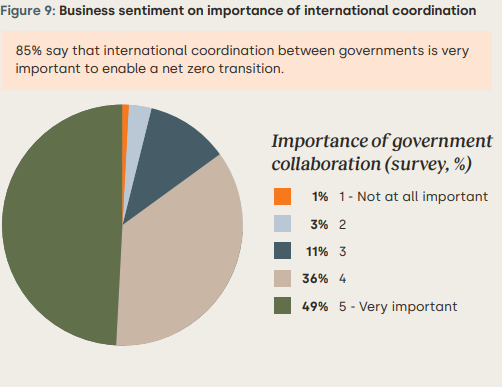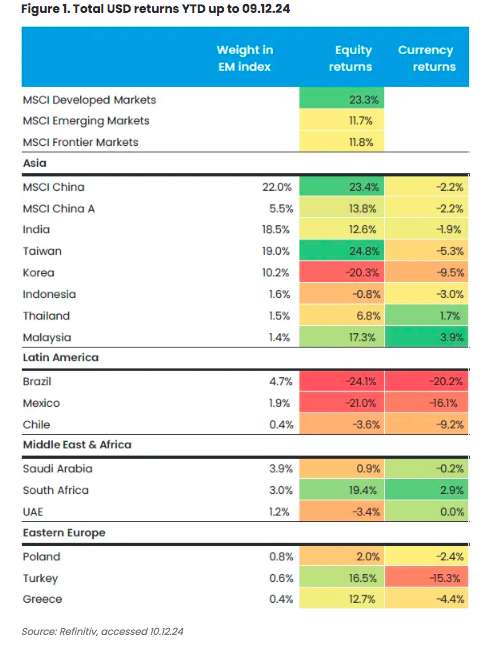
The U.S. elections and Donald Trump’s subsequent victory, the ETF boom, the future of wealth management, and global wealth were some of the topics that left quotes defining the year.
Expert from XP, São Paulo, September 2024
Alberto Bernal, Chief Strategist, Institutional Desk of XP Investments: “Is Trump inflationary?” Bernal believes he is not and argues that the deglobalization Trump promises by reindustrializing the U.S. will not happen.
Mohamed El-Erian, Chief Economic Advisor at Allianz and former CEO and Chief Investment Officer at PIMCO: “In the next five years, there will be more inflation because we are in a fragmented world.”
Boston, September 2024
Mike W. Roberge, MFS: “The next 30 years will not resemble the last 30. Looking ahead to the next 5 or 10 years, we expect markets to be more challenging, with greater volatility.”
August 2024, Amidst a Mini Stock Market Crash
Cohen Analysis (Argentine Firm):
“In our view, the market is overreacting to events, as economic prospects remain positive, with activity naturally on a soft-landing trajectory. In a week with a ‘light’ calendar of publications, attention will focus on service activity indicators, trade balances, and the earnings season nearing its conclusion.”
April 2024, X Funds Society Investment Summit in Palm Beach
Maria Quinn, Investment Advisory Research Specialist at Vanguard:
“Eighty-four trillion dollars will change hands in the next 20 years,” she stated during her presentation at the Funds Society event. She added, “Financial advisors have the opportunity to address gaps and work on them to ensure families don’t lose money and that new generations listen to them.” Quinn emphasized, “No matter the generation, FAs sell trust.”
Montevideo, Compass Investor Day, August 2024
Brian Doherty, Managing Director and CIO of Wellington Management:
“Deglobalization is a reality, as is the new industrial revolution related to energy, which is an inflationary topic,” he said. Doherty viewed the mini-crash of Monday the 5th as an opportunity to buy and adapt to the “new regime of volatility.”
March 2024, IV Investment Summit of Funds Society in Houston
Scott Edgcomb, Global Product Investment Strategist at MFS:
At the Funds Society event, Edgcomb reviewed the context of U.S. equities. “The largest index values drove overall performance and further increased market concentration,” he commented. He also noted, “The dissociation of the magnificent seven causes dispersion in results.”
Punta del Este, March 2024, LATAM ConsultUs Kick-Off
Benjamin Trombley, Managing Director at Apollo:
“Traditional markets have become a kind of ‘commodity.’ Active management doesn’t outperform indexes, but index-following vehicles (like ETFs) trap you in the market when everything falls. We facilitate corporate financing, which markets no longer do. In the U.S. and globally, this is being done by the private sector, not big banks.”
Montevideo, December 2024
Guillermo Davies, Partner at Buda Partners:
“Manager selection is the most important thing in private markets.”
London/Montevideo, June 2024, Americas Magazine
William López, Head of LatAm & US Offshore at Jupiter AM:
“I believe active management will not survive unless the products are truly differentiating compared to a benchmark index.”
Santiago de Chile, October 2024
Gabriel Ruiz, President of BlackTORO Global Wealth Management:
“The role savings play for a Latin American is not the same as for an American. That’s why Americans are much more willing to take on volatility risk.”
Joanna Castro, Executive Director of Investment Advisory at Credicorp Capital:
“The industry knows it. The next big growth vein is not institutional but individual clients,” she said, referring to the rise of semi-liquid products among affluent clients.
Buenos Aires, March 2024, Americas Magazine
José Noguerol, Co-Founder of BECON IM:
“Firms that distribute funds to institutional clients make transactions, whereas we (in the Wealth Management segment) build relationships of trust.”
November 2024, Impact of Trump’s Election on Brazil
Trump’s reelection led to an immediate 1.3% drop in the Ibovespa, Brazil’s main stock index, which later moderated to a 0.65% loss by Wednesday afternoon.
Despite the initial stock market reaction, the dollar rose 0.5% to 5.78 reais. However, many Brazilians were misled by an incorrect exchange rate on Google, which showed the dollar climbing to 6.19 reais. This would have been a historical high if not for a detail: Google, relying on Morningstar data, displayed incorrect information for several hours before correcting it.
Mexico City, October 2024, 50th Anniversary of Vector Casa de Bolsa
Alan Stoga, President of the Tällberg Foundation and Chairman of Zemi, on renegotiating the U.S.-Mexico trade agreement:
“Trump can be managed. How do you do it? Understand that he is fundamentally transactional. He sees himself as the best negotiator in the world. Therefore, the Mexican side of the conversation must figure out what he wants, what you’re willing to give, how you’ll structure the negotiation, and where you’ll take it.”
Montevideo, November 2024, Women in Finance by LATAM ConsultUs
Mariela Gesto, Financial Advisor at Atlantis Global Investors:
“I love this job; I’ll never retire, even though it took many years of work, arriving earlier and leaving later than the men.”
Luisa Pollio, part of the historic Polio brokerage firm, now part of Nobilis:
“Working in the financial industry cost me blood, sweat, and tears because my family didn’t want me in it. I was the only woman. I succeeded by being persistent. At first, I was sent for coffee; one day, they let me attend a trading session. It was pure adrenaline. Over the years, we’ve gone from ink and pens to artificial intelligence.”











